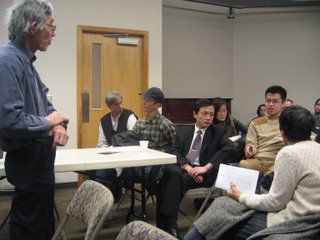 e treated humanely and became repentant at the Fushun War Criminal Camp, and became peace activists upon repatriation. After the video Mr. Kage gave us a lecture on the "three miracles" that the Fushun experience brought about - "One, why Japanese prisoners were generously treated; two, how they became repentant; and three, how the heritage of their unusual experience is carried on by younger people in Japan" (from the lecture synopsis prepared by Mr. Kage) . During the question and answer period, many of the over 30 participants who filled the meeting room at Nikkei Centre actively participated, including the several Chinese students and professionals whom we were very fortunate to have that evening (in the photo, Mr. Kage answers questions from Arc Z. Han and Vancent Zhu).
e treated humanely and became repentant at the Fushun War Criminal Camp, and became peace activists upon repatriation. After the video Mr. Kage gave us a lecture on the "three miracles" that the Fushun experience brought about - "One, why Japanese prisoners were generously treated; two, how they became repentant; and three, how the heritage of their unusual experience is carried on by younger people in Japan" (from the lecture synopsis prepared by Mr. Kage) . During the question and answer period, many of the over 30 participants who filled the meeting room at Nikkei Centre actively participated, including the several Chinese students and professionals whom we were very fortunate to have that evening (in the photo, Mr. Kage answers questions from Arc Z. Han and Vancent Zhu).I had read about the Fushun war criminals before in the book (『なぜ加害を語るのか』), or "Why We Talk About Our Crimes"' by Shin-ichiro Kumagai (Iwanami Booklet No. 659), but I knew I had known nothing when I saw the scene in the video where a former Kenpei officer Mr. Tsuchiya visited the daughter of the Chinese man whom he tortured and killed in 1936. The visit took place in 1990 when the daughter, Ms. Zhang, was now a professor at a medical university. The former officer was bowing his head on the floor, crying and apologizing to Ms. Zhang. She was wiping tears off her eyes, and at the end she took Tsuchiya's hands.
Crime, repentance, forgiveness, courage, and perhaps love and hope.... I cannot possibly begin to describe in words the emotions that filled the space that the former aggressor and its victim shared. I should not easily interpret the scene as one of forgiveness. The hand-shake with a man who killed her father must have been one of the most courageous and difficult things that she did in her life, and what drove that act of benevolence and what it really meant to her, to Tsuchiya, and people of China, Japan, and the world from the time of the war to now, is in God's realm. It is a miracle. It sends a message to the human kind that it should never forget - devils can become humans, and humans can become devils. The story of Miracle in Fushun has to be learned over and over again, for creating peace in today's and tomorrow's world.
Shuichi Kato, a prominent public intellectual and an outspoken critic of the growing conservatism in Japan, said in a radio interview with NHK in August 2005, "Young generations of today's Japan are not responsible for the war crimes of their ancestors, but they have a responsibility for learning the history and examine whether the elements of the society that caused the past crimes are still found in today's society or not." Kato points out four such elements that still exist in today's Japan in his book "War Responsibility of the Post-war Generations" (Iwanami Booklet No. 67) - manipulation by government through mass media, conformism, national isolationism (leading to ethnocentrism), and discrimination of all sorts. If these societal characteristics are still there, we may commit the same crimes again, so we must always maintain our critical thinking capabilities, and work to eliminate these elements of society.
What Kato recommends is not easy, but it can be done. I will use the lesson from Fushun in my everyday life, from moment to moment, starting now.
With my heartfelt thanks to Mr. Kage for this incredible learning opportunity.
Satoko
No comments:
Post a Comment